scend-, scen-, scand-, scan-, scans-
(Latin: to climb; to mount; by extension, a ladder)
ascend (verb), ascends; ascended; ascending
1. To go up, to rise, or to move toward the sky: A group of people watched their balloons which were slowly ascending into the sky.
2. Sloped or to slanted upward: Several paths ascended to the top of the mountain.
3. To rise to a higher or more powerful position in a government, company, etc.: A new national government recently ascended to power.
2. Sloped or to slanted upward: Several paths ascended to the top of the mountain.
3. To rise to a higher or more powerful position in a government, company, etc.: A new national government recently ascended to power.
ascendable, ascendible (adjective), more ascendable, more ascendible; most ascendable, most ascendible
1. Referring to something which can go up or move upward: The path leading into the mountain was ascendable because it had been used before by hikers who wanted to get to the top.
2. Pertaining to anything that is capable of rising from a lower level or station to a higher dimension: The bubbles Jane was creating were quite ascendable and, as a result, they were soaring up into the trees!
2. Pertaining to anything that is capable of rising from a lower level or station to a higher dimension: The bubbles Jane was creating were quite ascendable and, as a result, they were soaring up into the trees!
A situation in which someone is dominant; especially, because of a superior economic or political power: One of the politicians present at the G7 summit meeting considered having the position of ascendance and being quite influential and prevailing in the group.
1. A position of power in which a human can control or influence other people: Michael gained ascendancy in the debate with his opponent.
2. A situation or condition that prevails when one person or group has control over other people: Jack and Susan weren’t getting along in their marriage because the ascendancy of Jack’s wife became quite intolerable in that she was very commanding and dominant in her ways.
2. A situation or condition that prevails when one person or group has control over other people: Jack and Susan weren’t getting along in their marriage because the ascendancy of Jack’s wife became quite intolerable in that she was very commanding and dominant in her ways.
Someone who has become more powerful or gained more authority: The governor's popularity is still in the ascendant.
ascendant, ascendent (adjective); more ascendant, more ascendent; most ascendant, most ascendent
Being more powerful or gaining more power: The senator's popularity is no longer in the ascendant category.
ascendingly (adverb), more ascendingly, most ascendingly
Concerning how something moves upward or rises: The vines in Mary’s garden grew ascendingly from the supporting framework to the high wall behind it.
1. The state of moving up or soaring into the air: William made an ascension in the balloon so he could see more of the countryside.
2. A situation in which someone or something has moved to a higher or more powerful position: The newspaper article told about Chuck's ascension to CEO (Chief Executive Officer) of the company.
2. A situation in which someone or something has moved to a higher or more powerful position: The newspaper article told about Chuck's ascension to CEO (Chief Executive Officer) of the company.
ascensional (adjective), more ascensional, most ascensional
Related to an object or a substance which rises or moves up: David was enjoying the ascensional power of the balloon as it was going up higher into the sky.
1. A rising or climbing; an upward movement: The construction worker made a careful ascent up to the roof of the building.
The road made a sharp ascent to the top of the hill.
2. An advancement, a progression: The other employees were amazed about Margaret's ascent from secretary to president of the company in just five years.
condescend (verb), condescends; condescended; condescending
1. To behave toward other people as though they were socially or intellectually inferior: The movie director condescended to take advice from the stagehand.
2. To do something regarded as unimportant or demeaning in order to impress or appear to be generous toward others: The famous author always tried to treat her readers as equals and avoided the appearance of condescending to them.
3. To stoop or to lower oneself to the level of someone who is considered inferior: The actress condescended to allow the reporter to interview her about the award she received.
4. To deal with people in a patronizingly superior manner: The customer was condescending to the saleswoman who was trying very hard to be polite and to provide the best service possible.
5. To hesitate to do something: Michael refused to condescend in misrepresenting the facts because he knew they were accurate.
6. To put aside one's dignity or superiority voluntarily and assuming equality with someone who is regarded as inferior: The teacher was obviously condescending to the student's intellectual level in order to be understood.
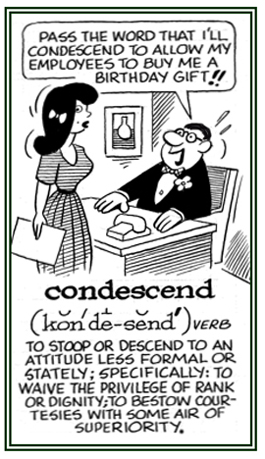
© ALL rights are reserved.
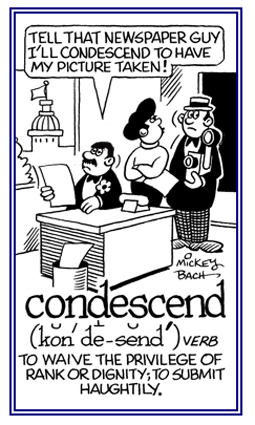
© ALL rights are reserved.
Go to this Word A Day Revisited Index
2. To do something regarded as unimportant or demeaning in order to impress or appear to be generous toward others: The famous author always tried to treat her readers as equals and avoided the appearance of condescending to them.
3. To stoop or to lower oneself to the level of someone who is considered inferior: The actress condescended to allow the reporter to interview her about the award she received.
4. To deal with people in a patronizingly superior manner: The customer was condescending to the saleswoman who was trying very hard to be polite and to provide the best service possible.
5. To hesitate to do something: Michael refused to condescend in misrepresenting the facts because he knew they were accurate.
6. To put aside one's dignity or superiority voluntarily and assuming equality with someone who is regarded as inferior: The teacher was obviously condescending to the student's intellectual level in order to be understood.


Go to this Word A Day Revisited Index
so you can see more of Mickey Bach's cartoons.
condescending (adjective), more condescending, most condescending
Regarding the display of a superior attitude or of being better than another person: The store clerk spoke to the customer in a condescending tone of voice.
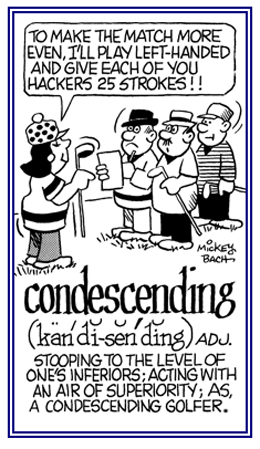
© ALL rights are reserved.
Go to this Word A Day Revisited Index
The actor's comments were offensive and condescending to the woman who asked for his autograph.

Go to this Word A Day Revisited Index
so you can see more of Mickey Bach's cartoons.
A voluntary presentation of equality with another person or people who are regarded as being inferior: The company's executive officer's condescension implied that he was lowering himself to the level of other employees who were less important or intelligent than he was.
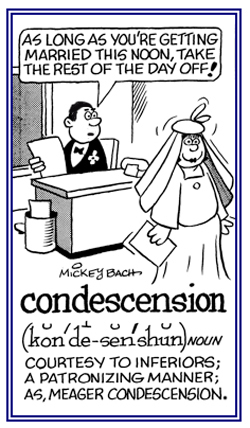
© ALL rights are reserved.
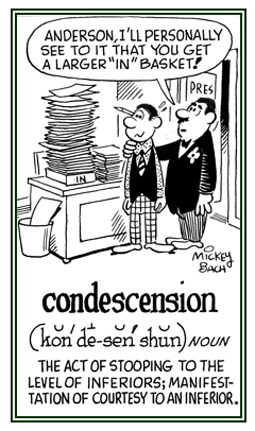
© ALL rights are reserved.
Go to this Word A Day Revisited Index
The reporter wrote an article in which he discussed the politics of his city without condescension or suggesting that he knew much more than the readers did about the situation.


Go to this Word A Day Revisited Index
so you can see more of Mickey Bach's cartoons.
de-escalate, deescalate (verb); de-escalates, deescalates; de-escalated, deescalated; de-escalating, deescalating
1. To diminish in size, magnitude, scope, or intensity: Perhaps because the birth control pill has been on the market, the number of births per year has de-escalated.
2. To reduce the level or intensity of a difficult or dangerous situation: Mrs. Smith tried to de-escalate the conflict between the two students who were about to start a big fight on the schoolyard.
2. To reduce the level or intensity of a difficult or dangerous situation: Mrs. Smith tried to de-escalate the conflict between the two students who were about to start a big fight on the schoolyard.
A decrease in strength, force, or size: The de-escalation of tension between the two countries was exceedingly welcome by the politicians and by the people of both countries!

